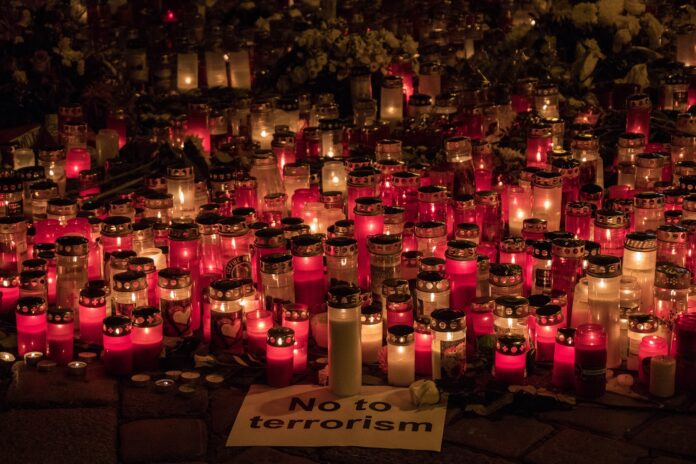By Patricia Pazos, Ph.D
Jihadism in Europe: Unpredictable and Difficult to Identify
The jihadist threat in Europe is alive and evolving. Terrorist attacks in Spain, France, and Germany in the past months have shown common characteristics: low preparation, low planning, and poor but efficient execution. This leads us to a conclusion: the jihadist threat is evolving, is alive, and it is difficult to prevent.
Let’s give some context: we have seen a decrease in terrorist attacks and terrorist activity after the fall of “the Califate” of ISIS, and, as we know, terrorism is a threat that comes in waves, and all signs indicate that we might be starting a new wave or stage that needs lots of attention, and, more precisely, adaptation.
Lone Actors
Lone actors continue to be a major cause of concern. As in past years in the EU, lone actors carried out every successful jihadist terrorist attack. When it comes to gender, the three confirmed jihadist attackers in 2021 were all men; they were not natives of the nations where they struck, but they were allowed to live there legally.
The Strategy of ISIS and its Impact in Europe
ISIS believes that in order to revive its caliphate, one strategy must be pursued: an attempt to free 10,000 of its fighters from Syrian jails and labor camps. ISIS members, their spouses, and children are housed in jails and camps administered by the Kurdish-led Syrian Democratic Forces.
Let’s remember that ISIS controlled 40% of Iraq and a third of Syria during its most successful period. Some experts clarify that the high number of ISIS members now in jail willing to escape -or be freed- would pose a serious security threat to the region and the world. History has shown that this is a clear danger that cannot be underestimated.
Terrorist Organizations in the EU
Extremist and terrorist organizations are still being identified and dismantled in the EU. Here are some examples of the types of operations that security forces are facing: In a joint operation between Denmark and Germany, 14 people were arrested at first, 13 in Denmark and one in Germany. The organization intended to use IEDs (a simple bomb made and used by unofficial or unauthorized forces) and guns in a terrorist attack in Europe. Three of the accused were brothers from Syria, ages 33, 36, and 40 (two were taken into custody in Denmark and one in Germany). We also see a pattern when it comes to family. Tight bonds between family and friends are found in small terrorist cells.
Minors
Terrorist-related activities increasingly involve minors. Teenagers spend hours in front of a screen and can quickly make close friends online and in real life. Example: A 16-year-old German national was detained for incitement and threats motivated by ISIS ideology, while a 16-year-old Syrian national was detained in Germany in September 2021 on suspicion of organizing and planning an attack against a synagogue in Hagen, North Rhine-Westphalia.

Modi Operandi
In recent years, there have been a high number of violent events that used terrorist tactics but, in the end, were not categorized as terrorist attacks. Although the authors of these crimes occasionally revealed evidence of religious radicalization, they also demonstrated other motivating elements, particularly mental health problems (we have seen that the pandemic has exacerbated some of these problems). Member States carefully looked into these situations and found that they were not caused by political or ideological beliefs. However, access to jihadist messaging online may be a catalyst for the escalation of violent behavior among certain individuals.
Geographical Location
The most affected countries by jihadism now in the EU are France, Germany, Spain, and Belgium. Regarding the activities, geographical location, and individuals involved, the jihadist ecosystem in the EU has largely remained consistent over time. In geographic terms, jihadist connections in the EU continued to be centered in and near significant urban centers. The mixed online-offline interactions that make up jihadist communities, however, have an impact on their behaviors and particularly reach a wide audience. In Member States, jihadists often work alone or in small groups that are spread out and don’t have clear positions or hierarchies.
Jihadist Cells
Jihadist cells are less frequent than in previous years. The reason varies, but mainly because of the successful work of security and intelligence forces and the cooperation among stakeholders. The second reason is behind planning: the chances of detecting a terrorist attack are more likely to happen during the planning phase.
Cells can emerge among close relatives and acquaintances, but they frequently grow outside of these networks thanks in large part to the internet and community links. Due to the lack of institutional hierarchies, certain people may hold more power than others, especially if they are older, more jihadist-minded, or perceived to know more about Islam. People who have lived in conflict areas and, curiously, people who have tried to travel there but have been stopped by criminal justice activity have also been seen to play significant roles in spreading the jihadist ideology and recruiting new members. While many jihadist organizations operate on a community scale, some have connections on a regional level, and a few on a global level. International networks can be built on the shared nationality and language of the participants.
The future of jihadism in Europe: What to Expect
Terrorism is now more difficult to predict than in recent years. Many factors may affect the current situation, including societal factors such as geopolitical and political instability. Extremist groups may use some changes in Member States to feed their narrative, promote online propaganda, and give a boost to recruitment. The economic situation, particularly instability, also aggravates extremist narratives and fuels radicalization. We cannot forget about mental health and the misuse of technologies, the young population can be easily manipulated, and self-radicalization is becoming more common. To tackle this complex ecosystem, we should be aware of these changes, tackle terrorism using a holistic approach, promote cooperation among stakeholders, and keep up the good work in prevention.



